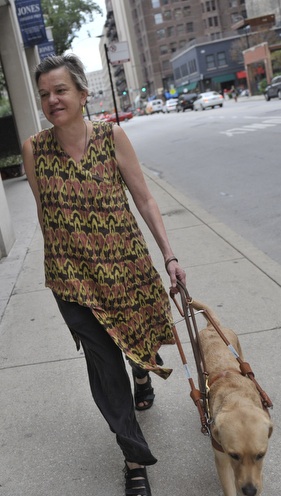Two of the memoir-writing classes I lead each week are sponsored by Lincoln Park Village, a non-profit organized by older adults who want to age at home. The Village boasts over 300 members, and its classes — everything from meditation to a “boot camp” that enhances memory — meet in people’s homes.
To kick off the new year, the Village Newsletter took an in-depth look at the human brain and perhaps it’s most valued — and vulnerable — aspect, memory. Hollis Hines, a writer in my Monday afternoon writing class, was asked to write an article for that newsletter about how blindness affects her writing teacher’s ability to remember things. Here’s an excerpt from that story:
The visual memories from the 26-year-old girl she was, understandably, are frozen in time. In some respects she will never age, nor will her family and friends; they and she are as they were in her perception long ago.
My sister Cheryl loves this about me, and just last weekend a friend from college happened to mention how she enjoys this aspect of my blindness as well. Both of them follow my blog, so I hope they aren’t too disappointed to read that Hollis also pointed out in her article that I am aware those perceptions may no longer be accurate! “But with no visual cues to replace them, the past is the present. Perhaps this partially explains the spunky, youthful energy that Beth exudes.” Ha! Maybe blindness does have its advantages after all!
Hollis explained how I sing a song of the list of U.S. presidents my great-niece Anita learned in school in order to navigate the streets in the Loop — “Madison, Monroe, Adams, Jackson” — and how I do simple math in my head for banking in order to keep an edge with numbers.
She swims at least 20 laps in a pool, and the first lap she thinks about what she must do today, and with each subsequent lap she thinks of a day in the future. That way she exercises both body and brain.
Questions Hollis asked when she interviewed me for the article got me thinking about how blindness can serve to both enhance and foil my memory. The lack of visual cues really does help me remember things: I’m not bothered by visual distractions. On the other hand, without seeing words in print, I can have a hard time remembering the name of an item or of a celebrity, much less how to spell them.
My mention of celebrities during the interview left Hollis wondering if I get any enjoyment from movies or television. Not really. It’s too much work keeping up with the action and the characters. I told Hollis I’d rather listen to an audio book, and that’s when it dawned on me. “You know, with all the imagining and memorizing I do all day long,” I told her, “Living my life is like reading a book!”
Hollis agreed and added, “it’s your own book of non-fiction.”
Needless to say, she got an A+ in class the next Monday.

It’s true…… I enjoy the thought of you remembering me as I was and not knowing me as the real deal of the year 2013. It’s like remembering John Kennedy or Elvis Presley from the fifties or Elizabeth Taylor or Marilyn Monroe when the were young starlets. I’m comfortable with who I am but it’s always nice to remember myself through your eyes. I think it would be nice if we would all create our own books of non-fiction.
You’ll always look good in my book, Cheryl!
I enter rooms in my house only to forget what the heck I meant to retrieve. When I mentioned my frustration to my GP, he chuckled knowingly (he’s my age) and said that this malady has a name. Destinesia :. 1. (n.) Going upstairs or downstairs and being unable to remember why. (Maybe I’m getting distracted by shiny objects.)
Destinesia. Yikes. I’m afraid we have an epidemic on our hands.
Leave a Response